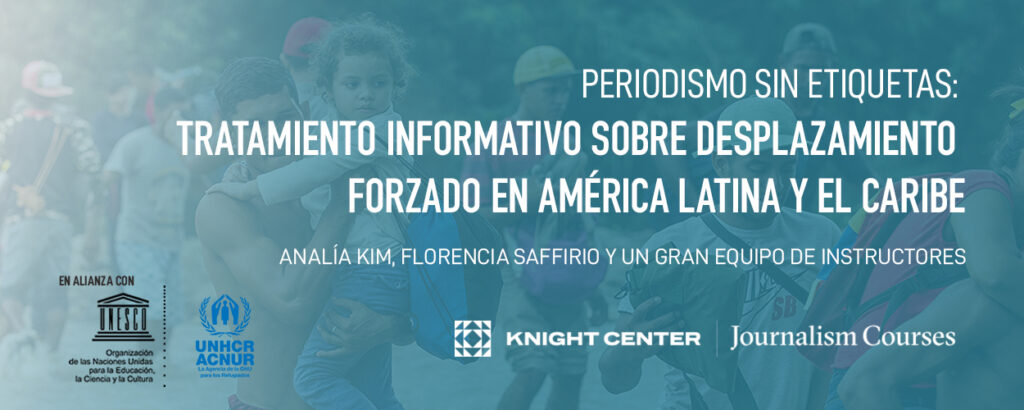
From the northern border of Mexico to the South Cone of South America, reporters and editors have struggled with the coverage of sensitive issues related to migrations, refugees and displaced people.
In association with two United Nations agencies, the Knight Center for Journalism in the Americas is offering a Spanish-language MOOC (massive open online course) to help journalists understand the complexity and sensitivity of the migration phenomenon and improve their coverage, avoiding stereotypes, stigmas or labels.

The free online course, “Journalism without labels: Informative handling of the forced displacement in Latin America and the Caribbean,” will be offered during four weeks, from August 31 to September 27, 2020 on Journalism Courses, the distance learning platform of the Knight Center.
Register now for this free course online here.
It’s very human to come up with labels when encountering something unknown, putting on it a weight and concepts based on one’s own imagination, and that is what journalists sometimes do when covering the migration phenomenon, said Florencia Saffirio, one of the leading instructors of the Knight Center MOOC.
“We are calling for a journalism that does not stigmatize, a journalism that does not contribute to stereotypes, but rather what it does is reinforce that migrants have a history, a voice that is worth showing,” Saffirio said.
Saffirio, who has been working on “UNESCO’s Regional Strategy for Latin America and the Caribbean in response to the situation of people in a context of mobility,” will be joined in coordination of the MOOC by a United Nations colleague: Analía Kim, from the Regional Office of the United Nations High Commissioner for Refugees (UNHCR) in Buenos Aires.
Kim and Safirio will lead a team of instructors — academics and journalists, who will talk about best practices to follow to avoid misinformation and stereotypes about people who are migrants and refugees in the region:
“We are grateful for the partnership with UNESCO and UNHCR in the production of this relevant course that will help journalists in Latin America and the Caribbean to improve their coverage of the migration phenomena,” said professor Rosental Alves, founder and director of the Knight Center. “We also want to acknowledge and thank the Universidad Central de Chile for its contribution to this project.”
The course “Journalism without labels: Informative handling of the forced displacement in Latin America and the Caribbean” is open to anyone and will be especially relevant for journalists and journalism professors and students in Latin America and the Caribbean.
The goal is to teach the concept tied to the forced displacement and migrations; how to decrease stigmatization and related disinformation; and to spark reflection about journalists’ social and ethical responsibilities.
The course will be divided into four weekly modules:
The course is asynchronous, which means there will be no live events scheduled at specific times. You can log into the course and complete activities at your own pace, at times and on days that are most convenient for you.
Click here to register for this course.